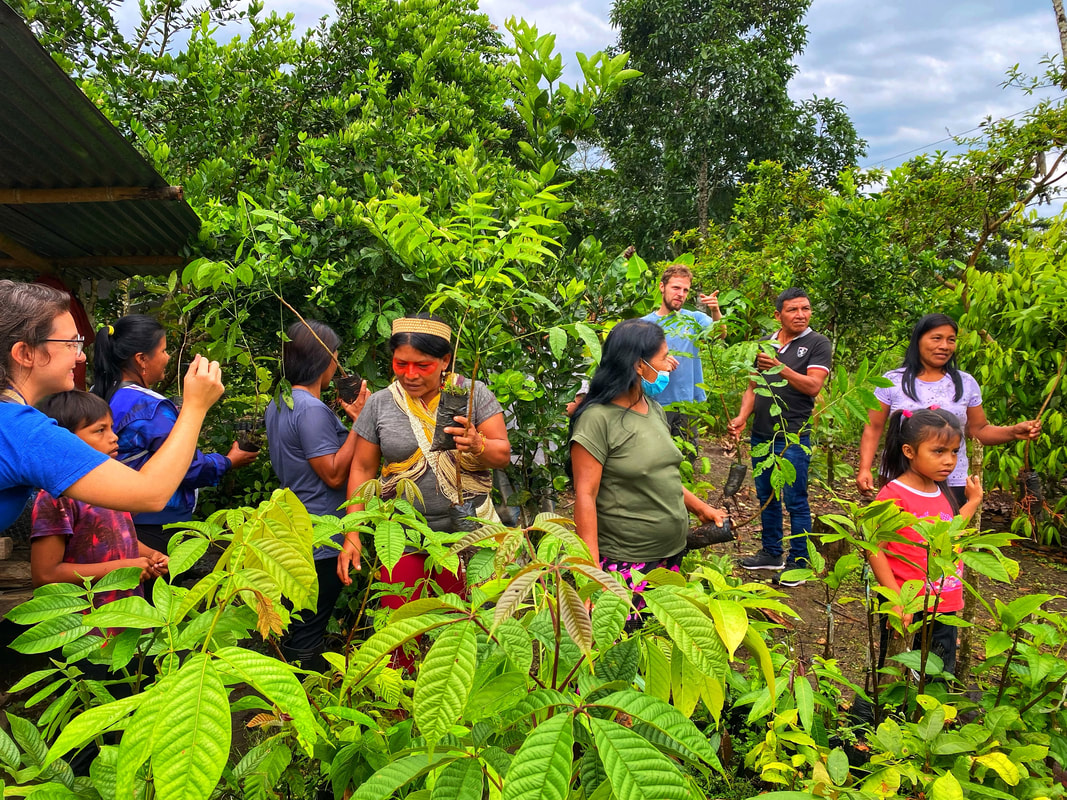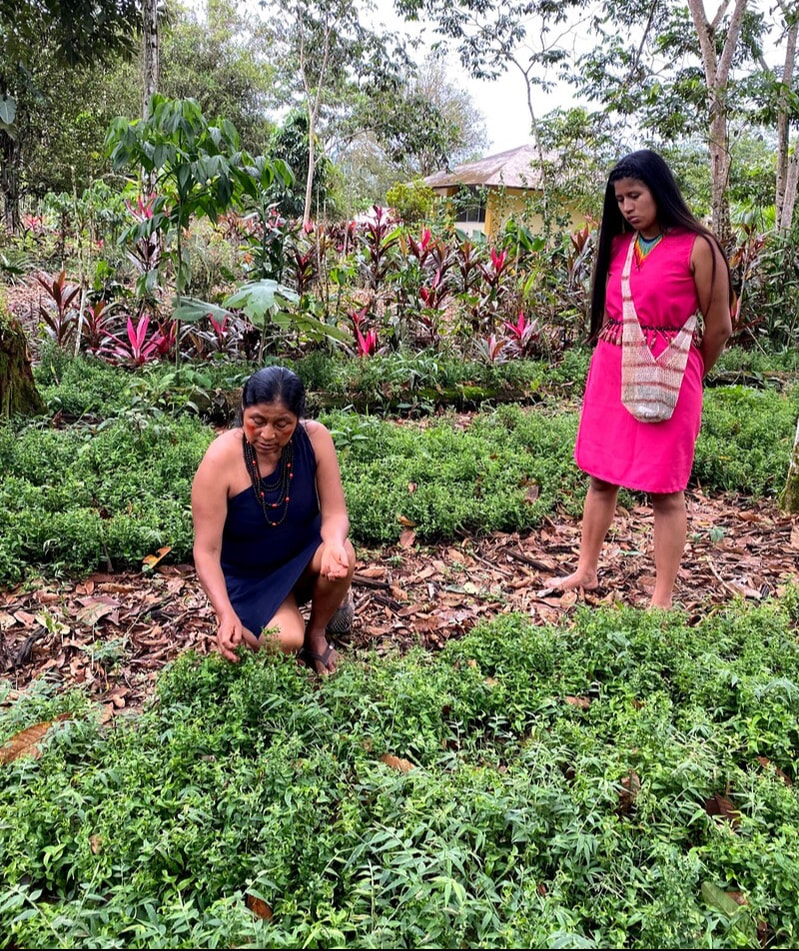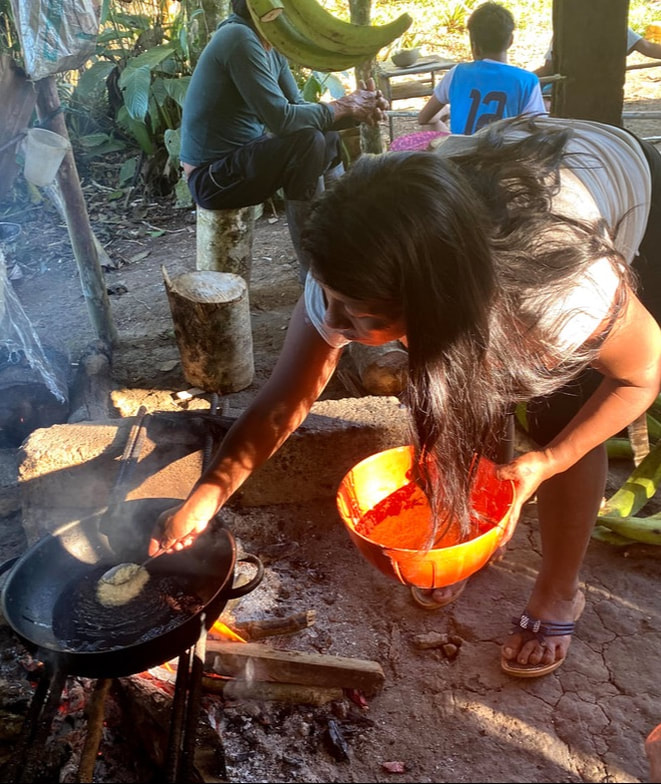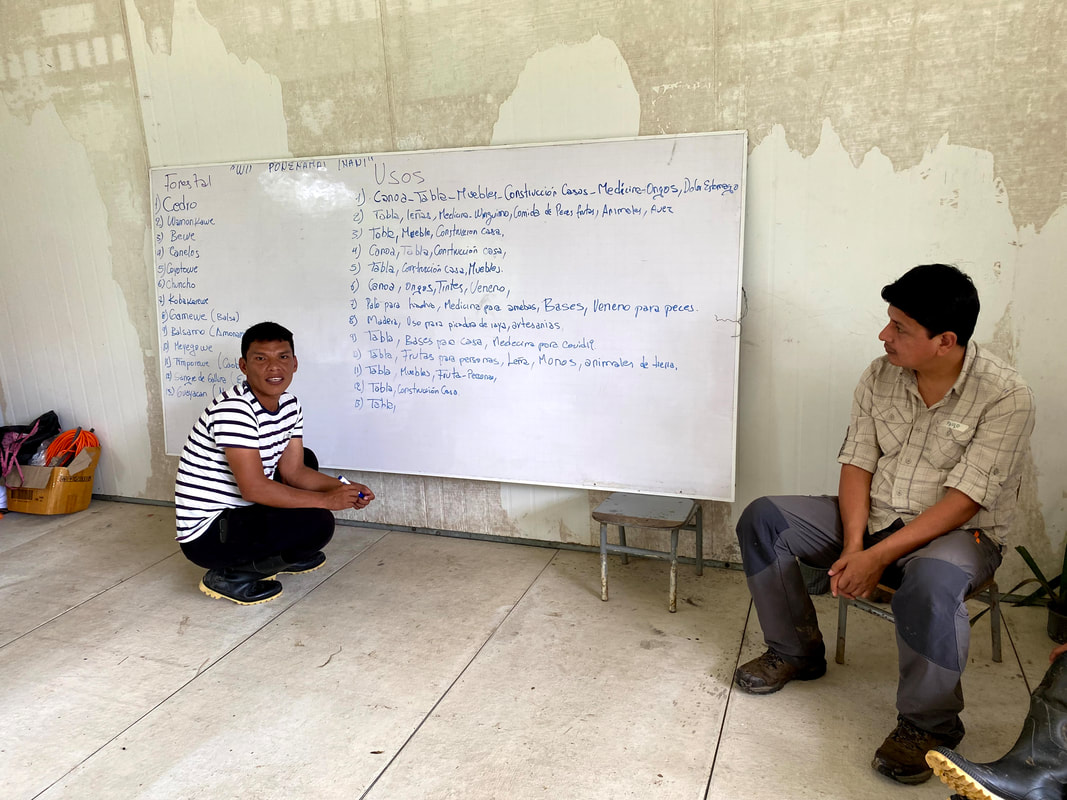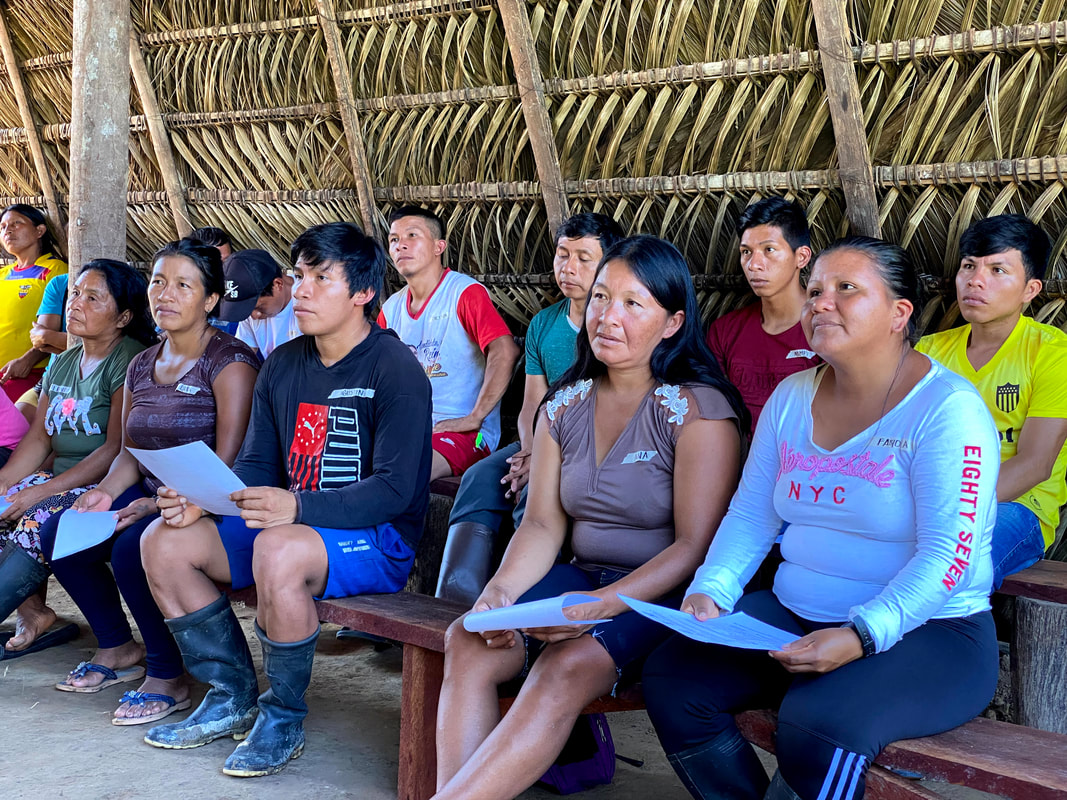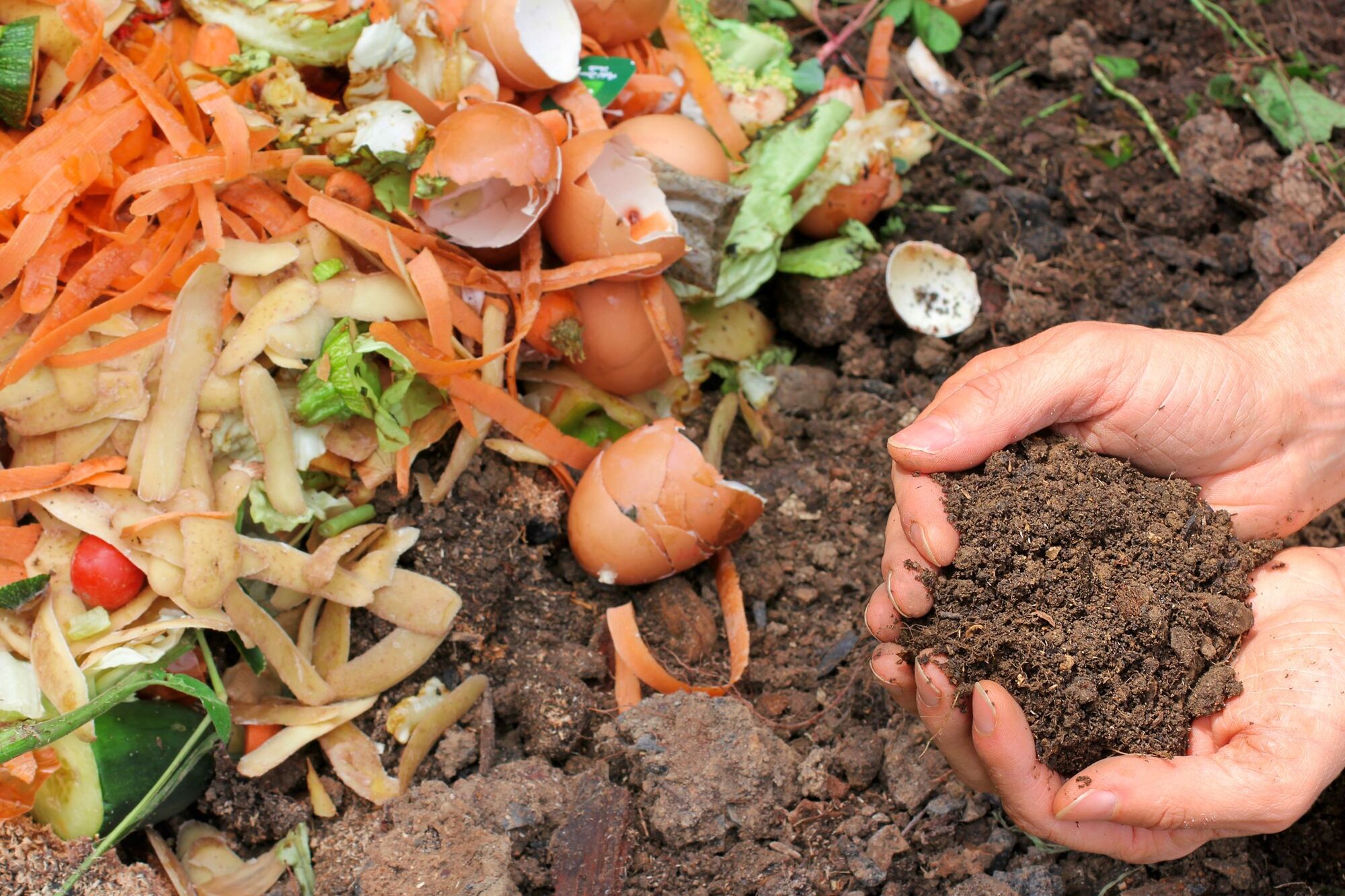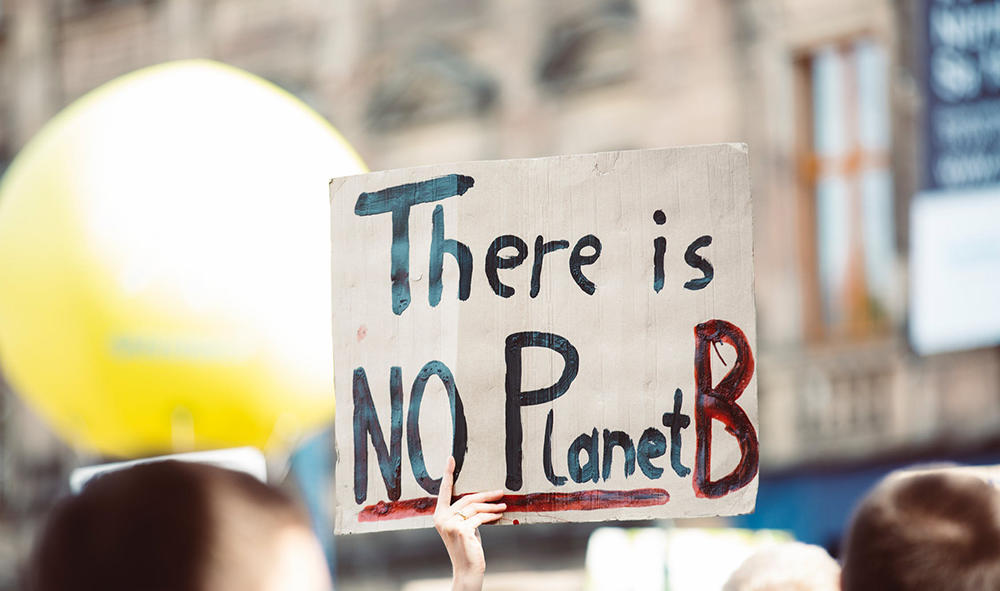An Indigenous-led Model of Food Sovereignty in the Ecuadorian Amazon / 15 minute read
Decades of resource extraction and colonization threaten the wellbeing of Waorani Indigenous communities and their ancestral role as guardians of biodiverse rainforest territory in the Pastaza Province of Ecuador. OWAP (Organización Waorani de Pastaza) is an Indigenous-led organization working to recover sustainable forest practices and build resilient livelihoods to strengthen the communities’ autonomy in the face of mounting threats.
We asked the OWAP leadership team about the challenges and successes of their work.
We asked the OWAP leadership team about the challenges and successes of their work.
Waorani families inaugurate a new traditional family garden
What are the main challenges for the community in the struggle for food sovereignty?
The greatest challenge for the Waorani in our fight for food sovereignty is to halt the gradual disappearance of local plants and trees vital for our health and nutrition, caused by decades of extractive exploitation, contamination and soil degradation. Today, plants, fruits and vegetables that just recently were used by our ancestors to feed or cure community members are in fact almost impossible to find in our territory. Instead, foreign seeds and products are being more regularly brought into our communities, resulting in biodiversity loss and our communities’ dependency on outside markets.
Likewise, loss of traditional plants and resources has a negative impact on our diet. Stuck in the vicious cycle of enduring local food shortages while suffering from poor economic conditions, many of our families are bound to consume very limited food rations daily, resulting in increased undernourishment rates across our communities. Many of us are in fact unable to acquire products from nearby cities or towns, where market prices are often inaccessible. Those who can instead access city products tend to consume highly unbalanced and unhealthy food. This circumstance is especially widespread among our youth, who consume food high in sugar and salt, causing malnutrition and sickness.
The greatest challenge for the Waorani in our fight for food sovereignty is to halt the gradual disappearance of local plants and trees vital for our health and nutrition, caused by decades of extractive exploitation, contamination and soil degradation. Today, plants, fruits and vegetables that just recently were used by our ancestors to feed or cure community members are in fact almost impossible to find in our territory. Instead, foreign seeds and products are being more regularly brought into our communities, resulting in biodiversity loss and our communities’ dependency on outside markets.
Likewise, loss of traditional plants and resources has a negative impact on our diet. Stuck in the vicious cycle of enduring local food shortages while suffering from poor economic conditions, many of our families are bound to consume very limited food rations daily, resulting in increased undernourishment rates across our communities. Many of us are in fact unable to acquire products from nearby cities or towns, where market prices are often inaccessible. Those who can instead access city products tend to consume highly unbalanced and unhealthy food. This circumstance is especially widespread among our youth, who consume food high in sugar and salt, causing malnutrition and sickness.
left: Two Waorani women collect local plants from their family garden | right: A Waorani woman cooks yuca collected from chacra
How does the fight for food sovereignty contribute to the community both socially and environmentally?
Our project is contributing to a positive change in our diet. Waorani families are now able to harvest and access home-grown food, increasing the use of local products such as chilis, wild garlic, yucca, and corn. Owing to the variety of harvested products and their highly nutritive properties, our families can cook healthy meals every day and diversify our children’s diet, improving their health at a critical age of growth. Adults are also happily retaking daily activities that were once carried out by their parents, feeling connected to their traditions and territory. What's more, families are feeling more self-sufficient and autonomous in their crucial duty to provide for their families, increasing a sense of ownership over livelihoods while improving household economies.
With the establishment of diversified native crops, the project is also contributing to biodiversity conservation and the revitalization of damaged rainforest across our territory. Amazonian land management systems are increasing yields by combining the production of agricultural crops with forest tree crops. Owing to the diversity of native species cultivated, these function as biological corridors for local fauna and flora that contribute to biodiversity conservation and revitalization.
Our project is contributing to a positive change in our diet. Waorani families are now able to harvest and access home-grown food, increasing the use of local products such as chilis, wild garlic, yucca, and corn. Owing to the variety of harvested products and their highly nutritive properties, our families can cook healthy meals every day and diversify our children’s diet, improving their health at a critical age of growth. Adults are also happily retaking daily activities that were once carried out by their parents, feeling connected to their traditions and territory. What's more, families are feeling more self-sufficient and autonomous in their crucial duty to provide for their families, increasing a sense of ownership over livelihoods while improving household economies.
With the establishment of diversified native crops, the project is also contributing to biodiversity conservation and the revitalization of damaged rainforest across our territory. Amazonian land management systems are increasing yields by combining the production of agricultural crops with forest tree crops. Owing to the diversity of native species cultivated, these function as biological corridors for local fauna and flora that contribute to biodiversity conservation and revitalization.
Ceibo's Waorani members train food sovereignty promoters on the use of local products
Additionally, food sovereignty promoters – those responsible for the gardens’ maintenance and trained under this project – are making use of organic fertilizers that are produced using local products, avoiding use of environmentally damaging chemicals. Finally, a change in diet is also leading to less consumption of city products that often come with plastic packaging, minimizing our waste.
The project is also bolstering knowledge transmission across generations and contributing to revitalizing vital cropping systems and practices that were on the verge of extinction. With more local plants growing across our territory and the incorporation of gardens into Waorani schools, youth are more knowledgeable of the value of our biodiversity and local products for our living and are becoming gradually more engaged in the fight to protect our territory.
Finally, our work towards food sovereignty contributes to rebuilding our identity as Waorani after decades of cultural assimilation and extreme community division caused by the long-standing pressure of extractive industries. Today, we feel proud of being Waorani for the richness of our territory. Plants, trees and animals pertaining to our land represent the essence of who we are as a people. We must keep a close to our territory, value and protect it to keep our identity standing in the face of threats to our survival and that of our forests.
The project is also bolstering knowledge transmission across generations and contributing to revitalizing vital cropping systems and practices that were on the verge of extinction. With more local plants growing across our territory and the incorporation of gardens into Waorani schools, youth are more knowledgeable of the value of our biodiversity and local products for our living and are becoming gradually more engaged in the fight to protect our territory.
Finally, our work towards food sovereignty contributes to rebuilding our identity as Waorani after decades of cultural assimilation and extreme community division caused by the long-standing pressure of extractive industries. Today, we feel proud of being Waorani for the richness of our territory. Plants, trees and animals pertaining to our land represent the essence of who we are as a people. We must keep a close to our territory, value and protect it to keep our identity standing in the face of threats to our survival and that of our forests.
Food sovereignty promoters attend a training
Your programs include a focus on youth education. How do you engage youth in securing the long-term sustainability of local plants?
One of the core aspects of our project is that it revitalizes ancestral Waorani culture and livelihoods by creating spaces for knowledge exchange between Waorani elders, teachers and youth that bolster the transmission of ancestral knowledge about native plants and harvesting practices.
Alongside establishing new family gardens for our communities, this year we reached a consensus with Waorani teachers and community members to also build food and medicinal gardens in schools to teach children about practices to effectively grow and make use of local plants for nutrition and medicinal purposes. Our goal is to form youth on the value of vital biodiversity to bring them closer to the territory and to boost our fight to gain food security.
We specifically aim to engage youth in research on local plant species under the guidance of teachers to develop newfound knowledge of the diversity and richness of local plants and spur greater use of traditional food and medicine across young generations. This way, we will wean dependency on city products while enhancing self-sustenance and dietary health in our communities.
We see this as an unprecedented opportunity to rescue vital biodiversity across our territory and to boost greater youth involvement in our fight to protect our territories for the decades to come.
World Centric provided a grant of $40,000 to support OWAPs critical work. Learn more about the project here.
Thank you to our partner Amazon Frontlines for connecting World Centric with OWAP and for providing translation support for this interview.
One of the core aspects of our project is that it revitalizes ancestral Waorani culture and livelihoods by creating spaces for knowledge exchange between Waorani elders, teachers and youth that bolster the transmission of ancestral knowledge about native plants and harvesting practices.
Alongside establishing new family gardens for our communities, this year we reached a consensus with Waorani teachers and community members to also build food and medicinal gardens in schools to teach children about practices to effectively grow and make use of local plants for nutrition and medicinal purposes. Our goal is to form youth on the value of vital biodiversity to bring them closer to the territory and to boost our fight to gain food security.
We specifically aim to engage youth in research on local plant species under the guidance of teachers to develop newfound knowledge of the diversity and richness of local plants and spur greater use of traditional food and medicine across young generations. This way, we will wean dependency on city products while enhancing self-sustenance and dietary health in our communities.
We see this as an unprecedented opportunity to rescue vital biodiversity across our territory and to boost greater youth involvement in our fight to protect our territories for the decades to come.
World Centric provided a grant of $40,000 to support OWAPs critical work. Learn more about the project here.
Thank you to our partner Amazon Frontlines for connecting World Centric with OWAP and for providing translation support for this interview.
